
Companies linked lower output to reduced intakes of new work, weaker market demand, difficulties in sourcing components and transportation delays.
The level of new business contracted for the second successive month in July, with decreases registered across the three product categories covered by the survey—consumer, intermediate and investment goods.
The reduction in total new orders was linked to the cost of living crisis, weak domestic demand, client uncertainty, warmer-than-usual weather and lower intakes of new export business, S&P Global said in a release.
Foreign demand fell for the sixth month in a row, amid reports of weaker inflows from mainland Europe (partly due to post-Brexit issues), the United States and China.
July data provided further signs that cost inflation and supply chain stresses were both passed their respective peaks. Vendor lead times lengthened to the least marked extent in almost two years and average input prices increased at the weakest pace since January 2021.
UK manufacturers reported a broad range of inputs as up in price, including chemicals, electronics, energy, food products, fuels, metals, packaging, timber and transportation.
The war in Ukraine, exchange rate factors, global inflationary pressures and input shortages were also blamed for increased purchasing costs.
Part of the rise in input prices was passed on to clients in the form of increased output charges in July. Selling prices rose for the 75th successive month, albeit at the slowest pace since May 2021.
Stocks of purchases and finished goods both continued to rise. The increase in the former was despite reduced input buying as companies acted to protect their cash flow.
Some firms noted that the receipt of previously delayed raw material deliveries had contributed to the build-up of inventories. Business optimism was unchanged from June's two-year low in July, S&P Global added.
Fibre2Fashion News Desk (DS)